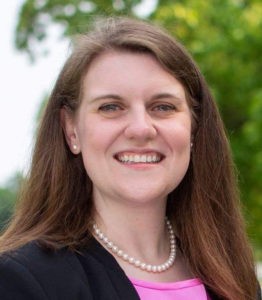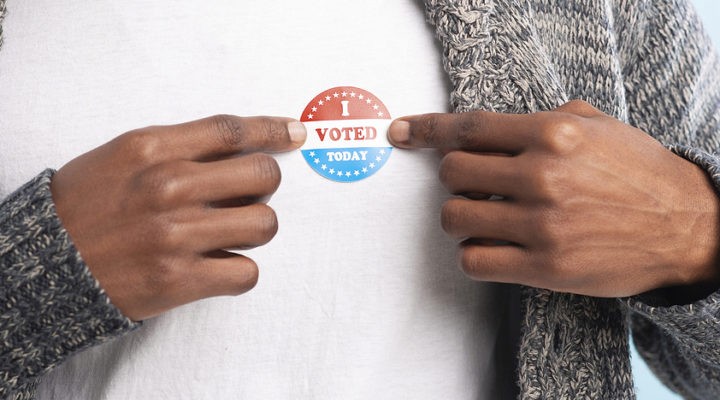This is the first in a series of first-person columns written by current and former BJC Fellows, a program of the Baptist Joint Committee for Religious Liberty, on the prompt: “Why vote?”
Aaron Sorkin’s West Wing holds a special responsibility in our family for the professions my husband and I find ourselves in currently.
As a precocious tween, I fell in love with the show and the structure behind political systems. In the somewhat circuitous route of my life, I followed this love to a degree in history with an emphasis on political science, then to seminary and to doctoral work on political theology.

Claire Hein Blanton
In my husband’s case (although he might disagree), he watched the entire series a few years ago and fell in love with politics. He now works as a political consultant.
There is a key difference between us, though, as he loves talking about politics and being in the thick of it. I would gladly only focus on the theoretical nature of political systems and theology and not get into the anxiety producing debates that somehow feed his soul.
In a way, then, I am the strange candidate to be writing a reflection on the importance to vote. He would gladly tell you about demographics and numbers, margins, policies and voter engagement. He works the polls and is a certified voter registration person.
I have many colleagues who do not believe Christians have a commandment to vote or who argue that Christians should not engage with the political system at all. To their first point, perhaps there is not a direct commandment where God instructs us to go to the ballot box on election days. There are, however, several places in both the Old Testament and New Testament that speak to how to be a good citizen (despite how anachronistic that terminology is for the Bible). If we extend that to modern societies, there is some implication that being a good citizen entails participating in the election of that societies’ orders. But that’s not what I want to focus on today.
I did not watch the first presidential debate, but based on the summaries I received from friends and families, it was a train wreck. That is why Christians should vote.
Our political system in the United States feels like it is in freefall. Perhaps that is an overstatement, but the inability of many people to carry on actual conversations with people across the political divide is worrying.
“The inability of many people to carry on actual conversations with people across the political divide is worrying.”
When societies become so mired in upheaval and discord, history shows us that bad things happen. Take a glancing look at the rise of fascism and authoritarianism in the 20th century, and then go back a bit further to the state of the societies just prior to that. Authoritarianism and hatred do not arise in healthy political systems.
While there are many reasons the United States may have entered a period of general distress, our current political climate has not aided in reducing it. And true to historical form, the current president has refused to affirm that he will concede power if he loses. Perhaps he is being glib, but he may be serious. As a scholar of history, politics and theology, we should take that as indicative of the political climate we find ourselves in. And as Christians, called to be peacemakers, we must reject the trajectory we find ourselves on currently.
The church should not tell the state how it should run, but neither should the state interfere in the ability of the church to carry out the basic tenets of our faith. Throughout the Bible, the faithful are continually called to remember the poor, the orphan, the alien, the imprisoned, the marginalized, the oppressed by economic injustice, the sick. As citizens we do not vote in a Christian government, but we can surely use our voice and our votes to elect individuals who will proactively work to focus less on their own power and privilege and more on addressing the least of these.
“As citizens we do not vote in a Christian government, but we can surely use our voice and our votes to elect individuals who will proactively work to focus less on their own power and privilege and more on addressing the least of these.”
It is an anathema for Christians to support white supremacy, to not see how our economic system has created a permanent class of poverty, to punish children for things outside their control by withholding social support, to embrace a culture that demonizes the other, to not see the inherent brutality in both our criminal justice system and the underfunded public education system that feeds into it.
It is an anathema to elect individuals who do not respect the value of the imago Dei in those who are other.
It is an anathema to elect individuals who refuse to do their jobs and refuse to acknowledge their own fault in the current state of politics.
Perhaps I ask too much. No candidate will ever fully embrace all the ideals I want, and in some regards, that’s a good thing. We need to be challenged rather than to merely live in an echo chamber. But we can do better, we must do better.
My husband lives in the present, and I live in the past (politically speaking). If we do not do better, we will repeat history.
As Christians, we must do better, and that begins first by more closely aligning our own lives to the gospel and then by being engaged politically and by voting.
Claire Hein Blanton is an ordained Baptist minister in Houston. She is currently studying for the Ph.D. in political theology from the University of Aberdeen. She was a BJC Fellow in 2018.


